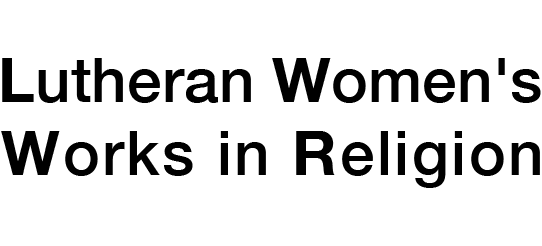Bibliography Author: Carol LaHurd
ETHICS
Carol LaHurd "Bowling Alone but Working and Worshiping Together" Winter In Dialog: A Journal of Theology. vol. 47, no. 4, 2008 : 385-395The article summarizes the strengths and weaknesses of the Evangelical Lutheran Church in America on the occasion of the church’s 20th anniversary, highlights the increasing diversity in the denomination, and emphasizes the importance of the strong ecumenical work that continues to take place, both nationally and internationally. Commitments to social justice, global connectedness and economic stewardship are also discussed.
BIBLICAL STUDIES
Carol LaHurd "Rhetorical Criticism, Biblical Criticism, and Literary Criticism: Issues of Methodological Pluralism" In Eastern Great Lakes Biblical Society Proceedings. vol. V , 1985 : 87-101The essay answers the question of how and when biblical critical methods can be used in combination and ways in which the texts themselves encourage shifts from one method to another. The particular test case is George Kennedy’s rhetorical analysis of the Sermon on the Mount in Matthew 5-7.
BIBLICAL STUDIES
Carol LaHurd "Reader Response to Ritual Elements in Mark 5:1-20" Winter In Biblical Theology Bulletin. vol. 20, 1990 : 154-160This article is an expansion and updating of the chapter described in The Daemonic Imagination edited by Detweiler and Doty.
BIBLICAL STUDIES
Carol LaHurd "Rediscovering the Lost Women in Luke 15" Summer In Biblical Theology Bulletin. vol. 24, no. 2, 1994 : 66-76Drawing on personal interviews with six Arab Christian women living in the United States, the article reinterprets the Luke 15 parables in light of the women’s own responses to the parables and their experiences of life in the modern contexts of Egypt and Lebanon.
BIBLICAL STUDIES
Carol LaHurd "Response to Mark McVann: Exactly What’s Ritual about the Experience of Reading/Hearing Mark’s Gospel?" In Semeia. vol. 67, 1994 : 199-208In response to McVann’s “Reading Mark Ritually: Honor-Shame and the Ritual of Baptism,” this essay summarizes McVann’s application of Victor Turner’s ritual model and assesses support for McVann’s thesis about Jesus’ status transformation in Mark’s gospel, while raising larger questions about the functioning of ritual in relation to boundaries and the experiences of reading and hearing narrative texts.
ETHICS
Carol LaHurd "The ‘Other’ in Biblical Perspective" In Currents in Theology and Mission. vol. 24, no. 5, October 1997 : 411-424Examining such texts as Jesus and the Samaritan woman in John 4, this essay surveys biblical treatments of the ethnic and religious “other” to provide resources for a current day hermeneutics of dialogue.
THEOLOGY
Carol LaHurd "Reading Each Others’ Scriptures" Winter In Dialog: A Journal of Theology. vol. 34, 1995 : 56-59In the process of reviewing Jon D. Levenson’s 1993 The Death and Resurrection of the Beloved Son, LaHurd raises questions about the lenses through which Jewish and Christians scholars interpret each other’s biblical texts.
BIBLICAL STUDIES
Carol LaHurd "Luther‘s Legacy in the Women‘s Bible Study" Spring In Dialog: A Journal of Theology. vol. 45, no. 1, 2006 : 29-35The article traces the history of Lutheran women’s Bible studies in the United States back to the late 1800s, reports reflections of contemporary Bible study authors and participants, and analyzes the role of biblical critical methods and Lutheran theology in such studies. With Susan McArver and Diane Jacobson.
THEOLOGY
Carol LaHurd "So that the Sinner Will Repent: Forgiveness in Islam and Christianity" Fall In Dialog: A Journal of Theology. vol. 35, no. 4, 1996 : 287-292In light of scriptural and theological traditions, LaHurd compares the concepts of repentance and forgiveness in Islam and Christianity, as well views of human sin and God’s response in each.
THEOLOGY
Carol LaHurd "Recite in the Name of Your Lord: Resources for Introducing Islam and the Qur’an to Christians" Summer In Dialog: A Journal of Theology. vol. 42, no. 2, 2002 : 170-172In the face of ongoing ethnic and political conflicts worldwide, reading and discussion of scripture across religious boundaries is one strategy for defusing antagonisms. Drawing upon the author’s experience with both biblical interpretation and dialogue among Jews, Christians, and Muslims, this essay describes potential benefits and hazards of such interfaith reading and provides practical suggestions for initiating this form of dialogue encounter.

